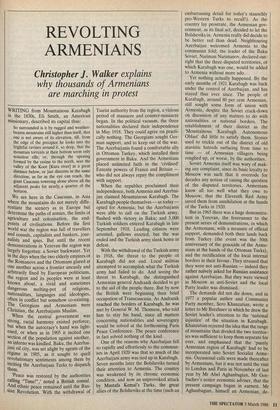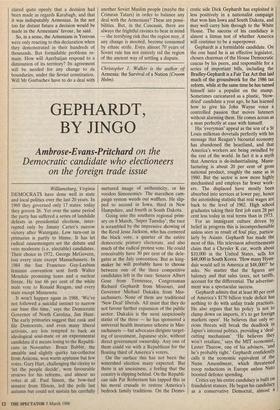REVOLTING ARMENIANS
Christopher J. Walker explains
why thousands of Armenians are marching in protest
WRITING from Mountainous Karabagh in the 1830s, Eli Smith, an American missionary, described its capital thus:
So surrounded is it by rugged and weather- beaten mountains still higher than itself, that one is not aware of its elevation, till, from the edge of the precipice he looks into the frightful ravines around it, so deep, that the mountain torrents at their bottom seem only noiseless rills; or, through the opening formed by the ravine to the north, sees the valley of the Koor [Kura river] at a great distance below, or just discerns in the same direction, as far as the eye can reach, the giant Caucasus towering alone above all the adjacent peaks for nearly, a quarter of the horizon.
We are here in the Caucasus, in Asia where the mountains do not merely diffe- rentiate the scenery as in Europe but determine the paths of armies, the limits of agriculture and colonisation, the end- points of civilisations. Before the first world war the region was full of travellers and consuls, capitalists and bankers, jour- nalists and spies. But until the recent demonstrations in Yerevan the region was largely forgotten: a Soviet backwater. Yet in the days when the two elderly empires of the Romanovs and the Ottomans glared at one another across a frontier uneasily and arbitrarily fixed by European politicians, the region and its peoples were at least known about, a vivid and sometimes dangerous melting-pot of religions, nationalities, languages and ideologies, often in conflict but somehow co-existing. The Georgians and Armenians were Christian, the Azerbaijanis Muslim. When the central government was strong, racial harmony existed perforce; but when the autocracy's hand was light- ened, or when as in 1905 it incited one section of the population against another, an inferno was kindled. Baku, the Azerbai- jani oil city, was set alight by agents of the regime in 1905, as it sought to quell revolutionary sentiments among them by inciting the Azerbaijani Turks to dispatch them.
`Peace was restored by the authorities calling "Time!",' noted a British consul. And ethnic peace remained until the Rus- sian Revolution. With the withdrawal of Tsarist authority from the region, a vicious period of massacre and counter-massacre began. In the political vacuum, the three nationalities declared their independence in May 1918. They could agree on practi- cally nothing. The Georgians sought Ger- man support, and to keep out of the war. The Azerbaijanis found a comfortable ally in Ottoman Turkey, which installed their government in Baku. And the Armenians placed unlimited faith in the `civilised' Entente powers of France and Britain who did not always repay the compliment with support.
When the republics proclaimed their independence, both Armenia and Azerbai- jan claimed Mountainous Karabagh. The Karabagh people themselves — as today opted for Armenia; but the Azerbaijanis were able to call on the Turkish army, flushed with victory in Baku; and 5,000 Turkish soldiers entered Karabagh in late September 1918. Leading citizens were arrested, gallows erected; but the war ended and the Turkish army slunk home in defeat.
With the withdrawal of the Turkish army in 1918, the threat to the people of Karabagh did not end. Local militias attempted to accomplish what the Turkish army had failed to do. And seeing the threat to Karabagh, the distinguished Armenian general Andranik decided to go to the aid of the people there. But by now the British were beginning their brief occupation of Transcaucasia. As Andranik reached the borders of Karabagh, he was met by General W. M. Thomson, who told him to stay his hand, since all matters concerning nationalities and sovereignty would be solved at the forthcoming Paris Peace Conference. The peace conference in fact solved nothing of the kind.
One of the reasons why Azerbaijan fell so rapidly and effortlessly to the commun- ists in April 1920 was that so much of the Azerbaijani army was tied up in Karabagh. Seven months later the Bolsheviks turned their attention to Armenia. The country was weakened by its chronic economic condition, and now an unprovoked attack by Mustafa Kemal's Turks, the great allies of the Bolsheviks at the time (such an embarrassing detail for today's staunchly pro-Western Turks to recall!). As the country lay prostrate, the Armenian gov- ernment, as its final act, decided to let the Bolsheviks in. Armenia really did decide to be better red than dead. Neighbouring Azerbaijan welcomed Armenia to the communist fold; the leader of the Baku Soviet, Nariman Narimanov, declared out- right that the three disputed territories, of which Karabagh was one, would be added to Armenia without more ado.
Yet nothing actually happened. By the early months of 1921 Karabagh was back under the control of Azerbaijan, and has stayed thus ever since. The people of Karabagh, around 80 per cent Armenian, still sought some form of union with Armenia, despite the Soviet crack-down on discussion of any matters to do with nationalities or national borders. The establishment of their district as the `Mountainous Karabagh Autonomous Oblast' did little to satisfy them. Stories used to trickle out of the district of old atavistic hatreds surfacing from time to time — of Armenian villagers being roughed up, or worse, by the authorities.
Soviet Armenia itself was wary of mak- ing any complaint, since its basic loyalty to Moscow was such that it overrode for decades any notion of raising the question of the disputed territories. Armenians know all too well what they owe to Moscow; that the Eleventh Red Army saved them from annihilation at the hands of the Turks in 1920.
But in 1965 there was a huge demonstra- tion in Yerevan, the forerunner to the present series of demonstrations, in which the Armenians, with a measure of official support, demanded both their lands back from Turkey (the event was the 50th anniversary of the genocide of the Arme- nians at the hands of the Ottoman Turks), and the rectification of the local internal borders in their favour. They stressed that they were not anti-Russian — indeed they rather naively asked for Russian assistance against Azerbaijan. But they were viewed in Moscow as anti-Soviet and the local Party leader was dismissed.
The demands did not die down, and in 1977 a popular author and Communist Party member, Sero Khanzatian, wrote a letter to Mr Brezhnev in which he drew the Soviet leader's attention to the 'national injustice' of the situation in Karabagh. Khanzatian rejected the idea that the range of mountains that divided the two territor- ies was sufficient to keep them separate for ever, and emphasised that the 'purely Armenian region of Karabagh' had to be incorporated into Soviet Socialist Arme- nia. Occasional calls were made thereafter by Armenians, but it was not until the visit to London and Paris in November of last year by Mr Abel Aghanbagian, Mr Gor- bachev's senior economic adviser, that the present campaign began in earnest. Mr Aghanbagian, himself an Armenian, de- dared quite openly that a decision had been made as regards Karabagh, and that it was indisputably Armenian. In the not too far distant future a decision would be made in the Armenians' favour, he said.
So, in a sense, the Armenians in Yerevan were only reacting to this declaration when they demonstrated in their hundreds of thousands. But formidable problems re- main. How will Azerbaijan respond to a diminution of its territory? Its agreement will be needed for any change to its boundaries, under the Soviet constitution. Will Mr Gorbachev have to do a deal with another Soviet Muslim people (maybe the Crimean Tatars) in order to balance any deal with the Armenians? These are possi- bilities. But, in the Caucasus, there are always the frightful ravines to bear in mind — the terrifying risk that the region may, if any change is mooted, become consumed by ethnic strife. Even almost 70 years of Soviet rule has not entirely rid the region of the ancient way of settling a dispute.
Christopher J. Walker is the author of Armenia: the Survival of a Nation (Croom Helm).



















































 Previous page
Previous page